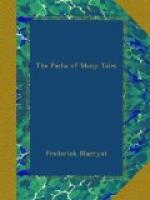“I think that story should be written down,” observed the pacha, after a pause of a few moments.
“I have already given directions, your highness, and the Greek slave is now employed about it, improving the language to render it more pleasing to the ears of your sublime highness, should it be your pleasure to have it read to you on some future day.”
“That is right, Mustapha, if I recollect well, the Caliph Haroun used to command them to be written in letters of gold, and be deposited in the archives: we must do the same.”
“The art no longer exists, your highness.”
“Then we must be content with Indian-ink,” replied the pacha, lifting the pitcher to his mouth, and emptying it.
“The sun will soon be down, Mustapha, and we must set off.”
Chapter II
The pacha called for coffee, and in a few minutes, accompanied, as before, by Mustapha and the armed slaves, was prowling through the city in search of a story-teller. He was again fortunate, as after a walk of half an hour, he overheard two men loudly disputing at the door of a small wine-shop, frequented by the Greeks and Franks living in the city, and into which many a slave might be observed to glide, returning with a full pitcher for the evening’s amusement of his Turkish master, who, as well as his betters, clandestinely violated the precepts of the Koran.
As usual he stopped to listen, when one of the disputants exclaimed—“I tell thee, Anselmo, it is the vilest composition that was ever drunk: and I think I ought to know, after having distilled the essence of an Ethiopian, a Jew, and a Turk.”
“I care nothing for your distillations, Charis,” replied the other, “I consider that I am a better judge than you: I was not a monk of the Dominican order for fifteen years, without having ascertained the merit of every description of wine.”
“I should like to know what that fellow means by distilling people,” observed the pacha, “and also why a Dominican monk should know wine better than others. Mustapha, I must see those two men.”
The next morning the men were in attendance, and introduced; when the pacha requested an explanation from the first who had spoken. The man threw himself down before the pacha, with his head on the floor of the divan, and said,—“First promise me, your highness, by the sword of the prophet, that no harm shall result to me from complying with your request; and then I shall obey you with pleasure.”
“Mashallah! what is the Kafir afraid of? What crimes hath he committed, that he would have his pardon granted before he tells his story?” said the pacha to Mustapha.
“No crime towards your state, your sublime highness; but when in another country, I was unfortunate,” continued the man—“I cannot tell my story, unless your highness will condescend to give your promise.”




